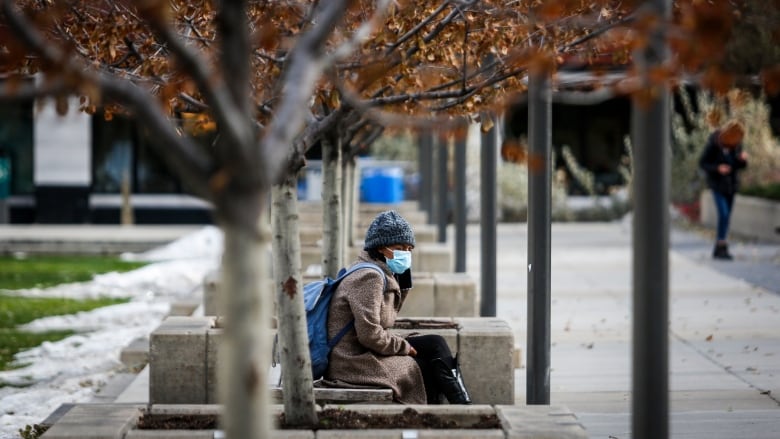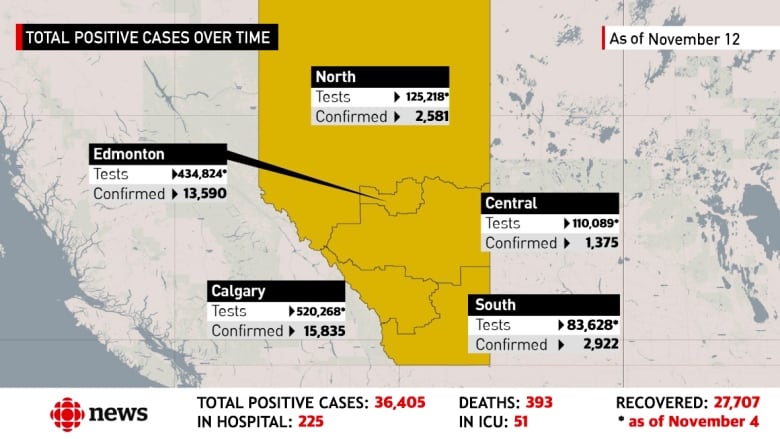What you need to know about COVID-19 in Alberta on Sunday, Nov. 15
Alberta reported 991 new cases on Sunday and 9,618 active cases in total

The latest:
- Alberta reported 991 new cases of COVID-19 on Sunday.The province now has9,618 active cases in total.
- Another six people have died for a total of 407deaths. There are 262 people in hospital, 58of whom are in intensive care beds.
- The province said the next detailed update on case numbers by region would be available Monday.
- Starting Friday,much ofthe province has suspended indoor group fitness programs, team sports andgroup performance activities, as well as reduce operating hours for bars and pubs until Nov. 27.
- AHS has introduced an onlinecontact tracing tool thatwill notify close contacts of positive cases by automated text message.
- A group of more than 430 Alberta physicians and three major health-care unions sent a letter to Premier Jason Kenneyon Nov. 12 endorsing the idea of a "circuit-breaker" lockdown as cases of COVID-19 continue to surge in the province.
What you need to know today in Alberta
For the next two weeks, a swathe ofAlberta will suspend indoor group fitness programs, team sports and group performance activities. All restaurants, bars, lounges and pubs in Calgary and Edmonton and other areas underenhanced status(areaswith more than 50 active cases per 100,000 people)must stop liquor sales by 10 p.m.
Alberta Premier JasonKenneyalso urgedAlbertans in any area under enhanced measures to not to have social gatherings in their homes.
The new measures were announced on Thursday. On Sunday,the province reported 991 new cases with 262 people in hospital.
"In the days ahead, we all have a role to play in getting case numbers down to protect our health care system, keep schools and businesses open, and protect vulnerable Albertans. This is our last chance to avoid more restrictive measures," Dr. Deena Hinshaw, Alberta's chief medical officer of heatlh, said on Twitter on Saturday.

The measures werereleased the same day aletter signed by more than 430 physicianscalled onKenney to implement a "circuit-breaker" targetedlockdown, on the heels of a similar call made by dozens of doctors earlier this week.
"There is no more time. We have to act now," saidDr. Tehseen Ladha, who co-authored the latest letter. "We need something strong and mandatory in order to bend the curve."
Albertans who test positive for COVID-19 can now access an online contact tracing tool to list the names andphone numbers ofclose contacts so that they can be notified about potential exposure with an automated text message.
The tool has been announced after cases became so high that AHSannounced it would be hiring more contact tracersandno longer notify people who have been found to be in close contact to an infected personunless they are deemed to belinked to a "high-priority setting."
Hospitals in Calgary are preparing for an influx of patients in the coming days and weeks.Dr. Peter Jamieson,the medical director at Foothills hospital, says the city's ICUs are operating at over 80 per cent capacity. If necessary,COVID-19 patients couldbe sent to atemporary tent facility at the Peter Lougheed hospital or to the Alberta Children's Hospital.
Contending with three COVID-19 outbreaks, Edmonton's Grey Nuns Community Hospitalhas been placed on diversion protocols, meaning most critical patients are being redirected to other emergency departments across the city.The measures mean critical care patients being transported by EMS are not being accepted by the emergency department, AHS said.Ambulances are being dispatched to other emergency departments in Edmonton.
Maintaining appropriate staffing levels in Edmonton hospitals has also been a challenge as COVID-19 cases continue to climb, and some doctors warn that staff are burning out.
The premier has warned thatAHSmay need to cancel elective surgeries, as it did in the spring, to make more room for potential COVID patients, should case numbers continue to escalate.
The reopening of schools has been highlighted as a potentialdriver of recentsurges in other parts of Canada and around the world, but Dr. Deena Hinshaw, the province's chief medical officer of health,doesn't believe they are causing the high rate of new cases in this province.
"I do not see evidence in Alberta of schools driving that increasing community transmission," shesaid. "It does seem to be the reverse,with community transmission causing increased pressure in schools."

Outbreaks at two shelters have left Calgary's homeless terrified to come in out of the cold for fear of catching COVID-19, says a group that helps people living on the streets. Be The Change YYC provides food, water, blankets, hygiene supplies, tents and tarps three nights a week in the city's downtown.
Here isthe regional breakdown of active cases reported on Friday, which does not include Saturday andSunday's numbers. The province said the next detailed breakdown would be available on Monday.
- Calgary zone:3,553, up from 3,504 reported Thursday.
- Edmonton zone: 3,572, up from 3,387.
- North zone: 553, up from 510.
- South zone: 512, down from 518.
- Central zone: 353, up from 347.
- Unknown: 50, up from 39.
Find out which neighbourhoods or communities have the most cases, how hard people of different ages have been hit, the ages of people in hospital, how Alberta compares to other provinces and more in: Here are the latest COVID-19 statistics for Alberta and what they mean
What you need to know today in Canada:
As of 6 a.m. ET on Sunday, provinces and territories in Canada had reported a cumulative total of 291,935 confirmed or presumptive coronavirus cases. Provinces and territories listed 232,915cases as recovered or resolved. A CBC News tally of deaths based on provincial reports, regional health information and CBC's reporting stood at 10,891.
Canada's chief public health officer, meanwhile,is warning that the soaring COVID-19 numbers in some of the hardest-hit provinces could soon overwhelm hospitals.
Dr.Theresa Tam says hospitals are already being forced to make the difficult decision to cancel certain elective surgeries and procedures.
Tam says the number of people with severe cases of COVID-19 continues to rise, with a daily average of more than 1,400 people being treated in hospitals over the past week.
InBritish Columbia, the Fraser Health Authority has announcedthree schools are closingfor two weeks after reportingcases ofCOVID-19. They're located in Surrey, Delta and New Westminster.
Saskatchewanannounceda record 308 new cases, with 123 of those cases coming from Saskatoon.Intensive care units in that cityare so full that officials havestopped accepting most out-of-town patients.
ManitobasaidSaturday15 more people have died of COVID-19, marking thehighest single-day increase in fatalities since the beginning of the pandemic.There are also 239 new cases, the province said.
Ontarioreported 1,581 new cases,hitting a new daily high.
Meanwhile,seven residents have diedat a Scarboroughlong-term care home amidan outbreak,while 136 other residents and 66 staff members have tested positive for the virus.
Quebec, which has seen more reportedCOVID-19 cases and deaths than any other Canadian province, topped more than 1,400 new casesfor the first time. In addition to the record1,448 new infections, the province also reported25 more deaths.
Nova Scotiareportedsix new casesSaturday the largest single-day increase in cases since May 15.
New Brunswickalso announcedsix new casesthe largest single-day increase in nearly a month.
Newfoundland and Labradorrecordedtwo new cases. The province said both are travel-related, one returning from Ontario and the other from the U.S.
Prince Edward Island'srevisedpandemic visitor and compassionate groundsvisitation protocolis expected to come into effect next week, and will apply both to public and private facilities on P.E.I.
Nunavutreportedfour new cases,all of them in the Hudson Bay community of Arviat. The latest cases make for a total of five in Arviat after the territory's health officials announced a case there on Friday.
Self-assessment and supports:
With winter cold and influenza season approaching, Alberta Health Services will prioritize Albertans for testing who have symptoms, and those groups which are at higher risk of getting or spreading the virus.
General asymptomatictesting is currently unavailable for people with no known exposure to COVID-19.
Those who test positive will be asked to use the online COVID-19 contact tracing tool, so that their close contacts can be notified by text message.
The province says Albertans who have returned to Canada from other countries must self-isolate. Unless your situation is critical and requires a call to 911, Albertans are advised to call Health Link at 811 before visiting a physician, hospital or other health-care facility.
If you have symptoms, even mild, you are to self-isolate for at least 10 days from the onset of symptoms, until the symptoms have disappeared.
You can find Alberta Health Services' latest coronavirus updates here.
The province also operates a confidential mental health support line at 1-877-303-2642 and addiction help line at 1-866-332-2322, both available 24 hours a day.
Online resources are available for advice on handling stressful situations and ways to talk with children.
There is a 24-hour family violence information line at 310-1818 to get anonymous help in more than 170 languages, and Alberta's One Line for Sexual Violence is available at 1-866-403-8000, from 9 a.m. to 9 p.m.














_(720p).jpg)


 OFFICIAL HD MUSIC VIDEO.jpg)
.jpg)



























































































